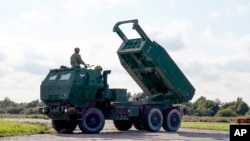Australia is boosting its long-range strike capability with the purchase of a U.S. missile system, the same long-range military technology Ukraine is using in its war with Russia.
Australia has signed an agreement to buy 20 High Mobility Artillery Rocket Systems, also known as HIMARS, by 2026.
Canberra also has a deal to acquire the Norwegian-made Naval Strike Missiles — anti-ship and land-attack missiles — for Australian warships next year.
The HIMARS system is made in the United States by Lockheed Martin Corp. It has proved its deadly efficiency in the war in Ukraine. On New Year's Day, Ukrainian forces used the missile system donated by the United States to kill dozens, possibly hundreds of Russian soldiers in the Donetsk region of eastern Ukraine.
Australian officials have said that HIMARS have a range of 300 kilometers.
Canberra is also working with Lockheed Martin to make a new generation of missiles with a range of up to 500 kilometers.
Australian Defense Industry Minister Pat Conroy told the Australian Broadcasting Corp. Thursday that the technology will give the military firepower it has never had before.
“We will have an Army ground-launched missile that can reach targets up to 300 kilometers away.” Conroy said.
He added that, “We are part of a developmental program with the United States called the Precision Strike Missile that will allow [the] army to hit targets in excess of 499 kilometers. So, this will give the Australian army a strike capability they have never had before.”
The Naval Strike Missiles are made by Norwegian company Kongsberg.
They will replace Harpoon anti-ship missiles on the Royal Australian Navy’s Hobart-class destroyers and Anzac-class frigates from 2024.
Australian officials have said both missile systems would help Australian forces “deter conflict and protect our interests.”
In August 2022, the federal government announced a review of Australia’s defense capabilities.
The assessment is being carried out by retired Air Chief Marshal Sir Angus Houston and former Defense Minister Stephen Smith.
They are expected to hand their report to the government next month.






